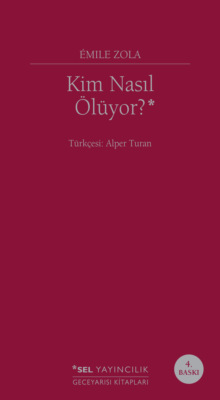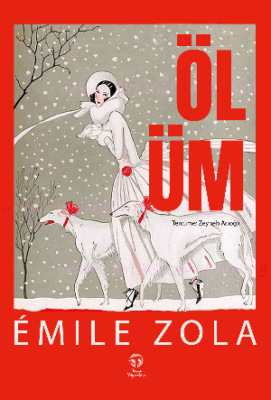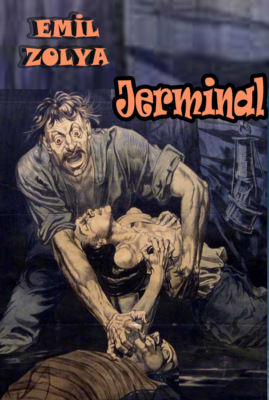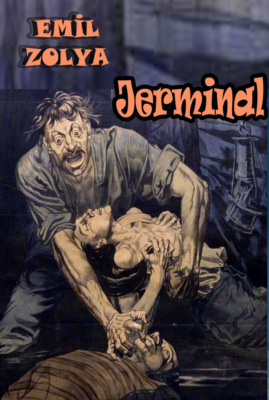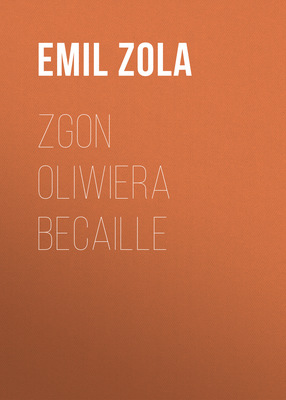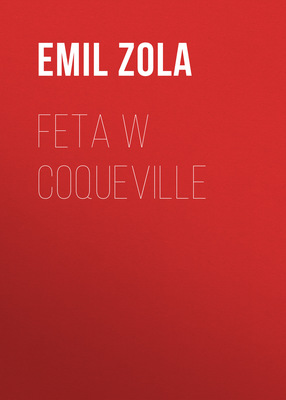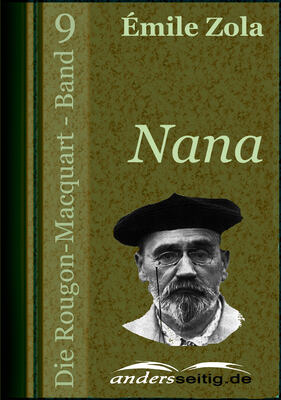Kitabı oku: «His Masterpiece», sayfa 6
Then suddenly changing the conversation: ‘By the way,’ he said, ‘my miserly father has apologised. He is afraid I shall drag his name through the mud, so he sends me a hundred francs a month now. I am paying my debts.’
‘Debts! you are too careful to have any,’ muttered Sandoz, with a smile.
In fact, Jory displayed a hereditary tightness of fist which much amused his friends. He managed to lead a profligate life without money and without incurring debts; and with the skill he thus displayed was allied constant duplicity, a habit of incessantly lying, which he had contracted in the devout sphere of his family, where his anxiety to hide his vices had made him lie about everything at all hours, and even without occasion. But he now gave a superb reply, the cry of a sage of deep experience.
‘Oh, you fellows, you don’t know the worth of money!’
This time he was hooted. What a philistine! And the invectives continued, when some light taps on one of the window-panes suddenly made the din cease.
‘She is really becoming a nuisance,’ said Mahoudeau, with a gesture of annoyance.
‘Eh? Who is it? The herbalist woman?’ asked Jory. ‘Let her come in; it will be great fun.’
The door indeed had already been opened, and Mahoudeau’s neighbour, Madame Jabouille, or Mathilde, as she was familiarly called, appeared on the threshold. She was about thirty, with a flat face horribly emaciated, and passionate eyes, the lids of which had a bluish tinge as if they were bruised. It was said that some members of the clergy had brought about her marriage with little Jabouille, at a time when the latter’s business was still flourishing, thanks to the custom of all the pious folk of the neighbourhood. The truth was, that one sometimes espied black cassocks stealthily crossing that mysterious shop, where all the aromatic herbs set a perfume of incense. A kind of cloistral quietude pervaded the place; the devotees who came in spoke in low voices, as if in a confessional, slipped their purchases into their bags furtively, and went off with downcast eyes. Unfortunately, some very horrid rumours had got abroad – slander invented by the wine-shop keeper opposite, said pious folks. At any rate, since the widower had re-married, the business had been going to the dogs. The glass jars seemed to have lost all their brightness, and the dried herbs, suspended from the ceiling, were tumbling to dust. Jabouille himself was coughing his life out, reduced to a very skeleton. And although Mathilde professed to be religious, the pious customers gradually deserted her, being of opinion that she made herself too conspicuous with young fellows of the neighbourhood now that Jabouille was almost eaten out of house and home.
For a moment Mathilde remained motionless, blinking her eyes. A pungent smell had spread through the shop, a smell of simples, which she brought with her in her clothes and greasy, tumbled hair; the sickly sweetness of mallow, the sharp odour of elderseed, the bitter effluvia of rhubarb, but, above all, the hot whiff of peppermint, which seemed like her very breath.
She made a gesture of feigned surprise. ‘Oh, dear me! you have company – I did not know; I’ll drop in again.’
‘Yes, do,’ said Mahoudeau, looking very vexed. ‘Besides, I am going out; you can give me a sitting on Sunday.’
At this Claude, stupefied, fairly stared at the emaciated Mathilde, and then at the huge vintaging woman.
‘What?’ he cried, ‘is it madame who poses for that figure? The dickens, you exaggerate!’
Then the laughter began again, while the sculptor stammered his explanations. ‘Oh! she only poses for the head and the hands, and merely just to give me a few indications.’
Mathilde, however, laughed with the others, with a sharp, brazen-faced laughter, showing the while the gaping holes in her mouth, where several teeth were wanting.
‘Yes,’ resumed Mahoudeau. ‘I have to go out on some business now. Isn’t it so, you fellows, we are expected over yonder?’
He had winked at his friends, feeling eager for a good lounge. They all answered that they were expected, and helped him to cover the figure of the vintaging girl with some strips of old linen which were soaking in a pail of water.
However, Mathilde, looking submissive but sad, did not stir. She merely shifted from one place to another, when they pushed against her, while Chaine, who was no longer painting, glanced at her over his picture. So far, he had not opened his lips. But as Mahoudeau at last went off with his three friends, he made up his mind to ask, in his husky voice:
‘Shall you come home to-night?’
‘Very late. Have your dinner and go to bed. Good-bye.’
Then Chaine remained alone with Mathilde in the damp shop, amidst the heaps of clay and the puddles of water, while the chalky light from the whitened windows glared crudely over all the wretched untidiness.
Meantime the four others, Claude and Mahoudeau, Jory and Sandoz, strolled along, seeming to take up the whole width of the Boulevard des Invalides. It was the usual thing, the band was gradually increased by the accession of comrades picked up on the way, and then came the wild march of a horde upon the war-path. With the bold assurance of their twenty summers, these young fellows took possession of the foot pavement. The moment they were together trumpets seemed to sound in advance of them; they seized upon Paris and quietly dropped it into their pockets. There was no longer the slightest doubt about their victory; they freely displayed their threadbare coats and old shoes, like destined conquerors of to-morrow who disdained bagatelles, and had only to take the trouble to become the masters of all the luxury surrounding them. And all this was attended by huge contempt for everything that was not art – contempt for fortune, contempt for the world at large, and, above all, contempt for politics. What was the good of all such rubbish? Only a lot of incapables meddled with it. A warped view of things, magnificent in its very injustice, exalted them; an intentional ignorance of the necessities of social life, the crazy dream of having none but artists upon earth. They seemed very stupid at times, but, all the same, their passion made them strong and brave.
Claude became excited. Faith in himself revived amidst the glow of common hopes. His worry of the morning had only left a vague numbness behind, and he now once more began to discuss his picture with Sandoz and Mahoudeau, swearing, it is true, that he would destroy it the next day. Jory, who was very short-sighted, stared at all the elderly ladies he met, and aired his theories on artistic work. A man ought to give his full measure at once in the first spurt of inspiration; as for himself, he never corrected anything. And, still discussing, the four friends went on down the boulevard, which, with its comparative solitude, and its endless rows of fine trees, seemed to have been expressly designed as an arena for their disputations. When they reached the Esplanade, the wrangling became so violent that they stopped in the middle of that large open space. Beside himself, Claude called Jory a numskull; was it not better to destroy one’s work than to launch a mediocre performance upon the world? Truckling to trade was really disgusting. Mahoudeau and Sandoz, on their side, shouted both together at the same time. Some passers-by, feeling uneasy, turned round to look, and at last gathered round these furious young fellows, who seemed bent on swallowing each other. But they went off vexed, thinking that some practical joke had been played upon them, when they suddenly saw the quartette, all good friends again, go into raptures over a wet-nurse, dressed in light colours, with long cherry-tinted ribbons streaming from her cap. There, now! That was something like – what a tint, what a bright note it set amid the surroundings! Delighted, blinking their eyes, they followed the nurse under the trees, and then suddenly seemed roused and astonished to find they had already come so far. The Esplanade, open on all sides, save on the south, where rose the distant pile of the Hotel des Invalides, delighted them – it was so vast, so quiet; they there had plenty of room for their gestures; and they recovered breath there, although they were always declaring that Paris was far too small for them, and lacked sufficient air to inflate their ambitious lungs.
‘Are you going anywhere particular?’ asked Sandoz of Mahoudeau and Jory.
‘No,’ answered the latter, ‘we are going with you. Where are you going?’
Claude, gazing carelessly about him, muttered: ‘I don’t know. That way, if you like.’
They turned on to the Quai d’Orsay, and went as far as the Pont de la Concorde. In front of the Corps Legislatif the painter remarked, with an air of disgust: ‘What a hideous pile!’
‘Jules Favre made a fine speech the other day. How he did rile Rouher,’ said Jory.
However, the others left him no time to proceed, the disputes began afresh. ‘Who was Jules Favre? Who was Rouher? Did they exist? A parcel of idiots whom no one would remember ten years after their death.’ The young men had now begun to cross the bridge, and they shrugged their shoulders with compassion. Then, on reaching the Place de la Concorde, they stopped short and relapsed into silence.
‘Well,’ opined Claude at last, ‘this isn’t bad, by any means.’
It was four o’clock, and the day was waning amidst a glorious powdery shimmer. To the right and left, towards the Madeleine and towards the Corps Legislatif, lines of buildings stretched away, showing against the sky, while in the Tuileries Gardens rose gradients of lofty rounded chestnut trees. And between the verdant borders of the pleasure walks, the avenue of the Champs Elysees sloped upward as far as the eye could reach, topped by the colossal Arc de Triomphe, agape in front of the infinite. A double current, a twofold stream rolled along – horses showing like living eddies, vehicles like retreating waves, which the reflections of a panel or the sudden sparkle of the glass of a carriage lamp seemed to tip with white foam. Lower down, the square – with its vast footways, its roads as broad as lakes – was filled with a constant ebb and flow, crossed in every direction by whirling wheels, and peopled with black specks of men, while the two fountains plashed and streamed, exhaling delicious coolness amid all the ardent life.
Claude, quivering with excitement, kept saying: ‘Ah! Paris! It’s ours. We have only to take it.’
They all grew excited, their eyes opened wide with desire. Was it not glory herself that swept from the summit of that avenue over the whole capital? Paris was there, and they longed to make her theirs.
‘Well, we’ll take her one day,’ said Sandoz, with his obstinate air.
‘To be sure we shall,’ said Mahoudeau and Jory in the simplest manner.
They had resumed walking; they still roamed about, found themselves behind the Madeleine, and went up the Rue Tronchet. At last, as they reached the Place du Havre, Sandoz exclaimed, ‘So we are going to Baudequin’s, eh?’
The others looked as if they had dropped from the sky; in fact, it did seem as if they were going to Baudequin’s.
‘What day of the week is it?’ asked Claude. ‘Thursday, eh? Then Fagerolles and Gagniere are sure to be there. Let’s go to Baudequin’s.’
And thereupon they went up the Rue d’Amsterdam. They had just crossed Paris, one of their favourite rambles, but they took other routes at times – from one end of the quays to the other; or from the Porte St. Jacques to the Moulineaux, or else to Pere-la-Chaise, followed by a roundabout return along the outer boulevards. They roamed the streets, the open spaces, the crossways; they rambled on for whole days, as long as their legs would carry them, as if intent on conquering one district after another by hurling their revolutionary theories at the house-fronts; and the pavement seemed to be their property – all the pavement touched by their feet, all that old battleground whence arose intoxicating fumes which made them forget their lassitude.
The Cafe Baudequin was situated on the Boulevard des Batignolles, at the corner of the Rue Darcet. Without the least why or wherefore, it had been selected by the band as their meeting-place, though Gagniere alone lived in the neighbourhood. They met there regularly on Sunday nights; and on Thursday afternoons, at about five o’clock, those who were then at liberty had made it a habit to look in for a moment. That day, as the weather was fine and bright, the little tables outside under the awning were occupied by rows of customers, obstructing the footway. But the band hated all elbowing and public exhibition, so they jostled the other people in order to go inside, where all was deserted and cool.
‘Hallo, there’s Fagerolles by himself,’ exclaimed Claude.
He had gone straight to their usual table at the end of the cafe, on the left, where he shook hands with a pale, thin, young man, whose pert girlish face was lighted up by a pair of winning, satirical grey eyes, which at times flashed like steel. They all sat down and ordered beer, after which the painter resumed:
‘Do you know that I went to look for you at your father’s; and a nice reception he gave me.’
Fagerolles, who affected a low devil-may-care style, slapped his thighs. ‘Oh, the old fellow plagues me! I hooked it this morning, after a row. He wants me to draw some things for his beastly zinc stuff. As if I hadn’t enough zinc stuff at the Art School.’
This slap at the professors delighted the young man’s friends. He amused them and made himself their idol by dint of alternate flattery and blame. His smile went from one to the other, while, by the aid of a few drops of beer spilt on the table, his long nimble fingers began tracing complicated sketches. His art evidently came very easily to him; it seemed as if he could do anything with a turn of the hand.
‘And Gagniere?’ asked Mahoudeau; ‘haven’t you seen him?’
‘No; I have been here for the last hour.’
Just then Jory, who had remained silent, nudged Sandoz, and directed his attention to a girl seated with a gentleman at a table at the back of the room. There were only two other customers present, two sergeants, who were playing cards. The girl was almost a child, one of those young Parisian hussies who are as lank as ever at eighteen. She suggested a frizzy poodle – with the shower of fair little locks that fell over her dainty little nose, and her large smiling mouth, set between rosy cheeks. She was turning over the leaves of an illustrated paper, while the gentleman accompanying her gravely sipped a glass of Madeira; but every other minute she darted gay glances from over the newspaper towards the band of artists.
‘Pretty, isn’t she?’ whispered Jory. ‘Who is she staring at? Why, she’s looking at me.’
But Fagerolles suddenly broke in: ‘I say, no nonsense. Don’t imagine that I have been here for the last hour merely waiting for you.’
The others laughed; and lowering his voice he told them about the girl, who was named Irma Becot. She was the daughter of a grocer in the Rue Montorgueil, and had been to school in the neighbourhood till she was sixteen, writing her exercises between two bags of lentils, and finishing off her education on her father’s doorstep, lolling about on the pavement, amidst the jostling of the throng, and learning all about life from the everlasting tittle-tattle of the cooks, who retailed all the scandal of the neighbourhood while waiting for five sous’ worth of Gruyere cheese to be served them. Her mother having died, her father himself had begun to lead rather a gay life, in such wise that the whole of the grocery stores – tea, coffee, dried vegetables, and jars and drawers of sweetstuff – were gradually devoured. Irma was still going to school, when, one day, the place was sold up. Her father died of a fit of apoplexy, and Irma sought refuge with a poor aunt, who gave her more kicks than halfpence, with the result that she ended by running away, and taking her flight through all the dancing-places of Montmartre and Batignolles.
Claude listened to the story with his usual air of contempt for women. Suddenly, however, as the gentleman rose and went out after whispering in her ear, Irma Becot, after watching him disappear, bounded from her seat with the impulsiveness of a school girl, in order to join Fagerolles, beside whom she made herself quite at home, giving him a smacking kiss, and drinking out of his glass. And she smiled at the others in a very engaging manner, for she was partial to artists, and regretted that they were generally so miserably poor. As Jory was smoking, she took his cigarette out of his mouth and set it in her own, but without pausing in her chatter, which suggested that of a saucy magpie.
‘You are all painters, aren’t you? How amusing! But why do those three look as if they were sulking. Just laugh a bit, or I shall make you, you’ll see!’
As a matter of fact, Sandoz, Claude, and Mahoudeau, quite taken aback, were watching her most gravely. She herself remained listening, and, on hearing her companion come back, she hastily gave Fagerolles an appointment for the morrow. Then, after replacing the cigarette between Jory’s lips, she strode off with her arms raised, and making a very comical grimace; in such wise that when the gentleman reappeared, looking sedate and somewhat pale, he found her in her former seat, still looking at the same engraving in the newspaper. The whole scene had been acted so quickly, and with such jaunty drollery, that the two sergeants who sat nearby, good-natured fellows both of them, almost died of laughter as they shuffled their cards afresh.
In fact, Irma had taken them all by storm. Sandoz declared that her name of Becot was very well suited for a novel; Claude asked whether she would consent to pose for a sketch; while Mahoudeau already pictured her as a Paris gamin, a statuette that would be sure to sell. She soon went off, however, and behind the gentleman’s back she wafted kisses to the whole party, a shower of kisses which quite upset the impressionable Jory.
It was five o’clock, and the band ordered some more beer. Some of the usual customers had taken possession of the adjacent tables, and these philistines cast sidelong glances at the artists’ corner, glances in which contempt was curiously mingled with a kind of uneasy deference. The artists were indeed well known; a legend was becoming current respecting them. They themselves were now talking on common-place subjects: about the heat, the difficulty of finding room in the omnibus to the Odeon, and the discovery of a wine-shop where real meat was obtainable. One of them wanted to start a discussion about a number of idiotic pictures that had lately been hung in the Luxembourg Museum; but there was only one opinion on the subject, that the pictures were not worth their frames. Thereupon they left off conversing; they smoked, merely exchanging a word or a significant smile now and then.
‘Well,’ asked Claude at last, ‘are we going to wait for Gagniere?’
At this there was a protest. Gagniere was a bore. Besides, he would turn up as soon as he smelt the soup.
‘Let’s be off, then,’ said Sandoz. ‘There’s a leg of mutton this evening, so let’s try to be punctual.’
Each paid his score, and they all went out. Their departure threw the cafe into a state of emotion. Some young fellows, painters, no doubt, whispered together as they pointed at Claude, much in the same manner as if he were the redoubtable chieftain of a horde of savages. Jory’s famous article was producing its effect; the very public was becoming his accomplice, and of itself was soon to found that school of the open air, which the band had so far only joked about. As they gaily said, the Cafe Baudequin was not aware of the honour they had done it on the day when they selected it to be the cradle of a revolution.
Fagerolles having reinforced the group, they now numbered five, and slowly they took their way across Paris, with their tranquil look of victory. The more numerous they were, the more did they stretch across the pavement, and carry away on their heels the burning life of the streets. When they had gone down the Rue de Clichy, they went straight along the Rue de la Chaussee d’Antin, turned towards the Rue de Richelieu, crossed the Seine by the Pont des Arts, so as to fling their gibes at the Institute, and finally reached the Luxembourg by way of the Rue de Seine, where a poster, printed in three colours, the garish announcement of a travelling circus, made them all shout with admiration. Evening was coming on; the stream of wayfarers flowed more slowly; the tired city was awaiting the shadows of night, ready to yield to the first comer who might be strong enough to take her.
On reaching the Rue d’Enfer, when Sandoz had ushered his four friends into his own apartments, he once more vanished into his mother’s room. He remained there for a few moments, and then came out without saying a word, but with the tender, gentle smile habitual to him on such occasions. And immediately afterwards a terrible hubbub, of laughter, argument, and mere shouting, arose in his little flat. Sandoz himself set the example, all the while assisting the charwoman, who burst into bitter language because it was half-past seven, and her leg of mutton was drying up. The five companions, seated at table, were already swallowing their soup, a very good onion soup, when a new comer suddenly appeared.
‘Hallo! here’s Gagniere,’ was the vociferous chorus.
Gagniere, short, slight, and vague looking, with a doll-like startled face, set off by a fair curly beard, stood for a moment on the threshold blinking his green eyes. He belonged to Melun, where his well-to-do parents, who were both dead, had left him two houses; and he had learnt painting, unassisted, in the forest of Fontainebleau. His landscapes were at least conscientiously painted, excellent in intention; but his real passion was music, a madness for music, a cerebral bonfire which set him on a level with the wildest of the band.
‘Am I in the way?’ he gently asked.
‘Not at all; come in!’ shouted Sandoz.
The charwoman was already laying an extra knife and fork.
‘Suppose she lays a place for Dubuche, while she is about it,’ said Claude. ‘He told me he would perhaps come.’
But they were all down upon Dubuche, who frequented women in society. Jory said that he had seen him in a carriage with an old lady and her daughter, whose parasols he was holding on his knees.
‘Where have you come from to be so late?’ asked Fagerolles of Gagniere.
The latter, who was about to swallow his first spoonful of soup, set it in his plate again.
‘I was in the Rue de Lancry – you know, where they have chamber music. Oh! my boy, some of Schumann’s machines! You haven’t an idea of them! They clutch hold of you at the back of your head just as if somebody were breathing down your back. Yes, yes, it’s something much more immaterial than a kiss, just a whiff of breath. ‘Pon my honour, a fellow feels as if he were going to die.’
His eyes were moistening and he turned pale, as if experiencing some over-acute enjoyment.
‘Eat your soup,’ said Mahoudeau; ‘you’ll tell us all about it afterwards.’
The skate was served, and they had the vinegar bottle put on the table to improve the flavour of the black butter, which seemed rather insipid. They ate with a will, and the hunks of bread swiftly disappeared. There was nothing refined about the repast, and the wine was mere common stuff, which they watered considerably from a feeling of delicacy, in order to lessen their host’s expenses. They had just saluted the leg of mutton with a hurrah, and the host had begun to carve it, when the door opened anew. But this time there were furious protests.
‘No, no, not another soul! Turn him out, turn him out.’
Dubuche, out of breath with having run, bewildered at finding himself amidst such howling, thrust his fat, pallid face forward, whilst stammering explanations.
‘Really, now, I assure you it was the fault of the omnibuses. I had to wait for five of them in the Champs Elysees.’
‘No, no, he’s lying! – Let him go, he sha’n’t have any of that mutton. Turn him out, turn him out!’
All the same, he ended by coming in, and it was then noticed that he was stylishly attired, all in black, trousers and frock-coat alike, and cravated and booted in the stiff ceremonious fashion of some respectable member of the middle classes going out to dinner.
‘Hallo! he has missed his invitation,’ chaffed Fagerolles. ‘Don’t you see that his fine ladies didn’t ask him to stay to dinner, and so now he’s come to gobble up our leg of mutton, as he doesn’t know where else to go?’
At this Dubuche turned red, and stammered: ‘Oh! what an idea! How ill-natured you are! And, besides, just attend to your own business.’
Sandoz and Claude, seated next to each other, smiled, and the former, beckoning to Dubuche, said to him: ‘Lay your own place, bring a plate and a glass, and sit between us – like that, they’ll leave you alone.’
However, the chaff continued all the time that the mutton was being eaten. When the charwoman had brought Dubuche a plate of soup and a piece of skate, he himself fell in with the jokes good-naturedly. He pretended to be famished, greedily mopped out his plate, and related a story about a mother having refused him her daughter because he was an architect. The end of the dinner thus became very boisterous; they all rattled on together. The only dessert, a piece of Brie cheese, met with enormous success. Not a scrap of it was left, and the bread almost ran short. The wine did run short, so they each swallowed a clear draught of water, smacking their lips the while amidst great laughter. And, with faces beaming, and well-filled paunches, they passed into the bedroom with the supreme content of folks who have fared very sumptuously indeed.
Those were Sandoz’s jolly evenings. Even at the times when he was hard up he had always had some boiled beef and broth to share with his comrades. He felt delighted at having a number of them around him, all friends, inspired by the same ideas. Though he was of their own age, he beamed with fatherly feelings and satisfied good-nature when he saw them in his rooms, around him, hand in hand, and intoxicated with hope. As he had but two rooms, the bedroom did duty as a drawing-room, and became as much theirs as his. For lack of sufficient chairs, two or three had to seat themselves on the bed. And on those warm summer evenings the window remained wide open to let in the air. From it two black silhouettes were to be seen rising above the houses, against the clear sky – the tower of St. Jacques du Haut-Pas and the tree of the Deaf and Dumb Asylum. When money was plentiful there was beer. Every one brought his own tobacco, the room soon became full of smoke, and without seeing each other they ended by conversing far into the night, amidst the deep mournful silence of that deserted district.
On that particular evening, at about nine o’clock, the charwoman came in.
‘Monsieur, I have done. Can I go?’
‘Yes, go to bed. You have left the kettle on the fire, haven’t you? I’ll make the tea myself.’
Sandoz had risen. He went off at the heels of the charwoman, and only returned a quarter of an hour afterwards. He had no doubt been to kiss his mother, whom he tucked up every night before she dozed off.
Meanwhile the voices had risen to a high pitch again. Fagerolles was telling a story.
‘Yes, old fellow; at the School they even correct Nature herself. The other day Mazel comes up to me and says: “Those two arms don’t correspond”; whereupon I reply: “Look for yourself, monsieur – the model’s are like that.” It was little Flore Beauchamp, you know. “Well,” Mazel furiously replies, “if she has them like that, it’s very wrong of her.”’
They almost all shrieked, especially Claude, to whom Fagerolles told the story by way of paying court. For some time previously the younger artist had yielded to the elder’s influence; and although he continued to paint with purely tricky skill, he no longer talked of anything but substantial, thickly-painted work, of bits of nature thrown on to canvas, palpitating with life, such as they really were. This did not prevent him, though, from elsewhere chaffing the adepts of the open-air school, whom he accused of impasting with a kitchen ladle.
Dubuche, who had not laughed, his sense of rectitude being offended, made so bold as to reply:
‘Why do you stop at the School if you think you are being brutified there? It’s simple enough, one goes away – Oh, I know you are all against me, because I defend the School. But, you see, my idea is that, when a fellow wants to carry on a trade, it is not a bad thing for him to begin by learning it.’
Ferocious shouts arose at this, and Claude had need of all his authority to secure a hearing.
‘He is right. One must learn one’s trade. But it won’t do to learn it under the ferule of professors who want to cram their own views forcibly into your nut. That Mazel is a perfect idiot!’
He flung himself backward on the bed, on which he had been sitting, and with his eyes raised to the ceiling, he went on, in an excited tone:
‘Ah! life! life! to feel it and portray it in its reality, to love it for itself, to behold in it the only real, lasting, and changing beauty, without any idiotic idea of ennobling it by mutilation. To understand that all so-called ugliness is nothing but the mark of individual character, to create real men and endow them with life – yes, that’s the only way to become a god!’
His faith was coming back to him, the march across Paris had spurred him on once more; he was again seized by his passion for living flesh. They listened to him in silence. He made a wild gesture, then calmed down.
‘No doubt every one has his own ideas; but the annoyance is that at the Institute they are even more intolerant than we are. The hanging committee of the Salon is in their hands. I am sure that that idiot Mazel will refuse my picture.’

